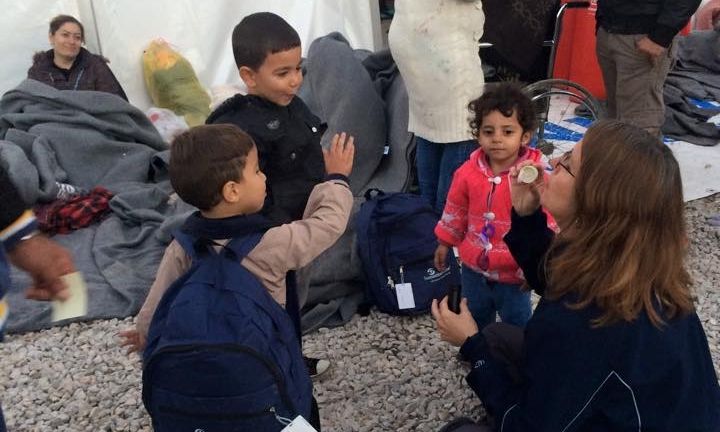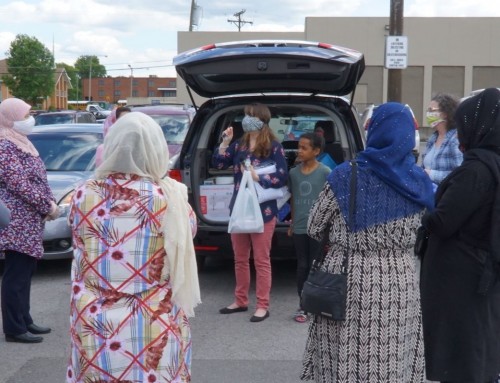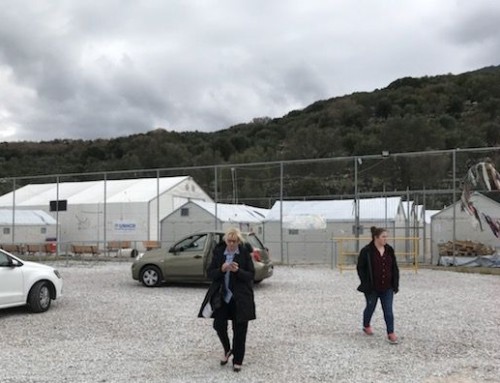I served with a Servant Group International team on a Greek island. Each day we accompanied approximately 1,000 refugees arriving on the northern coast. The refugees arrive on shore wet, hungry, thirsty, exhausted and frequently in shock from the 6-mile journey. Most have been displaced from their homes for at least a month – many have completely depleted their resources just to reach Europe.
Our group was assigned to work at the Skala-Sykaminia Transit Center. The center was the first stop for women, men and children who survived passage in flimsy, over-crowded dinghies launched by smugglers from the Turkish shoreline. For those who landed on the gentle shores of Skala – the transit center was a 2 kilometer uphill walk on a winding road. On an ordinary day, a hiker might stop along the road to enjoy a beautiful view of olive groves stretching down to the Aegean Sea while listening to the bells and bleats of grazing goats under the warm late morning sun. On this walk, however, the goal is a resting place, answers, sustenance, safety. The culverts testified to those who lightened their load by shedding wet clothing and life vests.
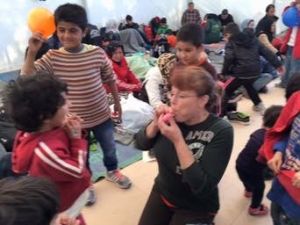
The transit center run by the United Nations High Commission for Refugees is staffed by Christian NGOs, most under the umbrella of Operation Mobilization or Samaritan’s Purse. The mostly 20 and 30-year old volunteers served with joy and compassion.
Our team arrived at the clean, mostly empty transit center thirty minutes prior to our 3:30 pm shifts. By late morning, the buses had caught up with the overflow from the night before and the early shift had time to clean and do inventory in anticipation of the new day’s arrivals. Following our briefing, we would go to our assigned posts until necessity shifted us elsewhere.
At the main gate, families and single men stood in parallel queues and were welcomed into the camp in groups of ten to twenty. The volunteers sang out, “Welcome,” “Hello,” “You’re safe” in Arabic, Dari, and English. Smiles spoke to all. Water, high-protein biscuits (and fruit the first two days) were made available as the refugees received their paper tickets for the free buses to the transit center ninety minutes away. As the warm sun dipped over the mountain, the urgency for dry clothing increased and volunteers staffing the clothing tent kept busy trying to find EU clothing donations that would fit and be culturally appropriate for Middle-Eastern women. Clothing tent humor became a bit like Goldilocks – too big, too small and “just right” was a moment to celebrate. Our new Syrian, Iranian, Iraqi and Afghan friends were so gracious even when clothing could not be found.
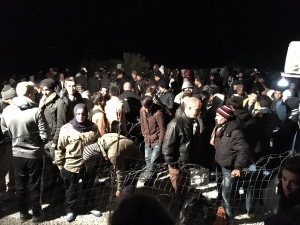 Nightfall also meant preparing for the “last bus for the night.” Inventory was assessed and the shift director would oversee blanket distribution and those assigned to kitchen duty would fire up the three propane burners for hot tea, hot water for baby bottles and, when available, ramen or rice.
Nightfall also meant preparing for the “last bus for the night.” Inventory was assessed and the shift director would oversee blanket distribution and those assigned to kitchen duty would fire up the three propane burners for hot tea, hot water for baby bottles and, when available, ramen or rice.
Many times we had to say “No.” No blankets. No dry socks. No room in the camp. At these times, we had an opportunity to say “Yes”. We said yes with our presence. You were with us as we waited in the cold with them.
Refugee movement beyond Greece is now uncertain. The tragedy in Paris has fueled fears of terrorists moving through doors open to refugees. I pray for our world leaders – may they be courageous and compassionate. For our church, may we be Jesus to our Muslim brothers and sisters. As my Greece trip roommate recently wrote: “Where would Jesus be? That’s where I want to be.”
Me, too.
